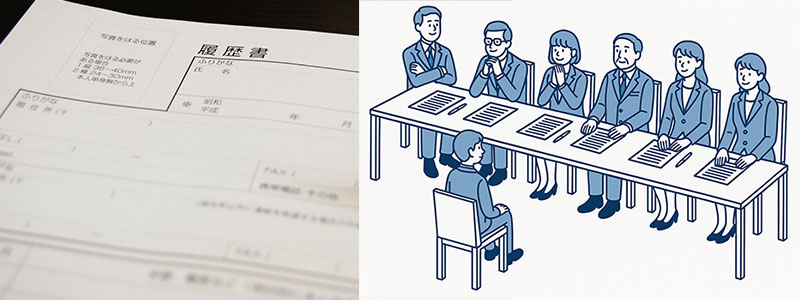Job-Hunting Exams in Japan
In Japan, companies often use a combination of written tests and interviews to evaluate applicants. Each company has its own process, so it’s important to know what to expect. In this guide, you’ll hear about the two main types: written exams and interview styles—along with some essential tips on communication and language use.
1. Written Tests(筆記試験)
These usually include:
- Entry Sheets (ES) and Résumés – Screened in advance to check your background, motivation, and writing style.
- Aptitude Tests – Used to assess cognitive ability, personality, and job fit.
Many companies now conduct these online, so it helps to be comfortable filling out forms and taking assessments on a computer.
2. Interview Tests(面接試験)
Interviews are often the most decisive part of the hiring process. Several types exist:
- Individual Interviews(個別面接)
One-on-one or one-on-several format, lasting 15 to 60 minutes. Deeper questions may be asked. Some companies also ask for short presentations.
- Group Interviews(集団面接)
Usually held early in the process. Several applicants are interviewed together. Your time to speak is limited, so being clear and concise is important.
- Group Discussions
A small group discusses a given topic. You’ll be evaluated not only on what you say, but also on how you listen, cooperate, and contribute.
- Informal Interviews(面談)
These are more casual, but still part of the selection process. Even if labeled “non-evaluative,” your attitude and communication still matter.
Communication Skills Matter
In Japan, how you communicate can be just as important as what you say. Using polite Japanese—keigo—is expected in most interviews. This shows respect and professionalism.
Even small word choices can make a difference. For example:
- Instead of casual 「ありがとう」, say 「ありがとうございます」 or 「本日はありがとうございます」 to sound more formal.
- A common phrase at the start or end of an interview is 「よろしくお願いいたします」, showing respect and humility.
- When entering or leaving a room, it’s polite to say:
・「失礼します」 (when entering or exiting)
・「失礼いたしました」 (after interrupting or at the end of a formal meeting)
Also, your tone, posture, and eye contact matter. Speak clearly, bow politely, and avoid slang or overly casual expressions.
Even if your Japanese isn’t perfect, showing effort through polite language and respectful manners will leave a strong impression.
